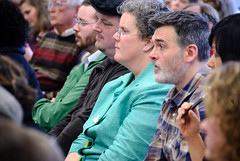We atheists are everywhere. Even in conservative Oklahoma where 95% of the people profess theistic belief, one will find atheists. Sadly, Oklahoma's KFOR NewsChannel 4 indicates that some have been threatened by Christians because of their lack of belief. Is it any wonder that many atheists still do not feel safe to openly admit their atheism?
The story profiles Oklahoma atheist, Kim Cole, described as one of a small number of openly atheistic people in the area. Others would agree to be interviewed only if their identity was concealed. Why?
"People do have their livelihoods threatened, their pets threatened, children bullied," says one atheist.If you have not personally experienced any of this, consider yourself lucky. But do not make the mistake of assuming that because it hasn't happened to you that it is not happening to others. It happens with alarming regularity in many parts of America. I think we should all remember this as we are encouraging atheists to "come out." What may be safe for us is not necessarily safe for everyone.
These Oklahoma atheists connect with other freethinkers on the internet and express themselves through blogging and by participating in various online forums. However, the report does an effective job of conveying the fear they regularly experience.
"There continues to be this prejudice that we must be bloodthirsty barbarians beating down the gates of civilization," says one atheist.I suspect that many of us can relate. I imagine that I would have less incentive to blog and to participate in online forums if I was surrounded by a group of freethinkers in my community.
When you hear about how atheists aren't joiners, remember that this may be true of some of us but that it is certainly not true of all atheists. Many do not enjoy the isolation and lack of connection they may feel. Developing strong atheist-oriented communities is an important step toward providing a meaningful alternative to religious delusion.


